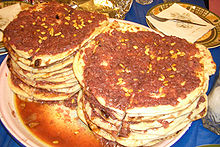- Musakhan
-
Musakhan (Arabic: مسخّن) is a Palestinian dish. It is composed of roasted chicken baked with onions, sumac, allspice, saffron, and fried pine nuts atop one or more taboon breads.
Contents
Culture
In Israel and the Palestinian Authority, musakhan is a favorite dish amongst Palestinians. The dish is simple to make and the ingredients needed are easily obtainable, which may account for the dish's popularity. Many of the ingredients used: olive oil, sumac and pine nuts, are widely grown on Palestinian land and frequently found in many forms of Palestinian cuisine.
Musakhan is a dish that one typically eats with one's hands. It is usually presented with the chicken on top of the loaf, and could be served with soup. The term 'musakhan' literally means "something that is heated."[1]
Palestinian sumac-scented roast chicken)
Meltingly tender chicken with the lemony flavor of sumac and the sweetness of caramelized onions, musakhan (المسخن) is a favorite dish of Palestinians everywhere. Sheets of flatbread encase the chicken as it cooks, protecting it from direct heat and soaking up delicious juices. Musakhan is traditionally eaten with the fingers. Sometimes spelled moussakhan or musakhkhan.
Recipe(4 to 6 servings)Chicken, cut into serving pieces -- 1 (3-pound) Dried sumac (see variations) -- 1/4 cup Ground cinnamon -- 1 teaspoon Ground allspice or cloves -- 1/2 teaspoon Ground nutmeg -- 1/4 teaspoon Salt and pepper -- to season Olive oil -- 1/4 cup Onions, thinly sliced -- 3 Lavash bread -- 2 large pieces
Method In a large bowl, mix together the chicken, sumac, spices, salt and pepper. Refrigerate and let marinate for at least 30 minutes, or preferably for several hours. Preheat oven to 350°F. Heat the olive oil in a large skillet over medium-high flame. Add the chicken, a few pieces at a time, and brown on both sides. Remove to a plate and set aside. Add the onions to the skillet and saute, stirring often, until the onions are cooked down and beginning to brown, 15 to 25 minutes. Line the bottom of a baking dish large enough to hold the chicken and onions with a sheet of lavash bread. Spread half the onions over the bread, then place chicken over the onions. Top the chicken with the remaining onions. Cover the whole dish with the remaining sheet of lavash bread, tucking in the sides to seal the chicken in. Sprinkle the lavash bread with water to lightly moisten it. Place the baking dish in the oven and bake for 1 1/2 to 2 hours, or until the chicken is cooked through (an insta-read thermometer inserted into the dish should register around 180°F). If the bread starts to burn, cover it lightly with aluminum foil. Remove the dish from the oven and let it rest about 10 minutes. Remove and discard the top bread and serve the chicken in its dish.
Variations Sumac is a common spice in the Middle East. The ground berries of a Middle Eastern bush, it can be found in most Middle Eastern markets. If you can't get it, use 3 tablespoons of paprika and a good squeeze of lemon juice. Of course, the taste won't be quite the same. Palestinians use bread called shrak or marquq for this dish. More commonly available Armenian lavash bread is very similar. Or use 2 or 3 pieces of pita bread that have been split in two horizontally. Some cooks add a big pinch of saffron to the sauteing onions. You can also garnish with toasted pine nuts or almonds.
Nutritional information
A typical recipe of Musakhan has the following nutrition facts per serving (around 300g):[2]
- Calories: 391
- Total fat (g): 33
- Saturated fat (g): 7
- Cholesterol (mg): 92
- Carbohydrates (g): 0
- Protein (g): 23
World records
Main article: List of Palestinian recordsOn April 20, 2010, the Palestinians registered a new record with the largest ever dish of Musakhan in Ramallah and entered it into the Guinness Book of World Records.[3] Palestinian Prime Minister, Salam Fayad, considered making the largest loaf of Musakhan in the world as a great achievement and a great honor for the Palestinian people, who devoted this achievement to their steadfastness on their land. He continued to state that, "This great achievement completely depended on Palestinian products, mainly olive oil. It also has a cultural dimension and a Palestinian message to the world that they want their legitimate rights."[4]
The total diameter of the 'Musakhan' loaf was 4 meters, with a total weight of 1,350 kg. Forty Palestinian cooks made use of 250 kg of flour, 170 kg of olive oil, 500 kg of onions and 70 kg of almond.
References
External links
Categories:- Articles copied to Wikibooks in need of cleanup
- Palestinian cuisine
- Palestine stubs
- Arab cuisine stubs
Wikimedia Foundation. 2010.

